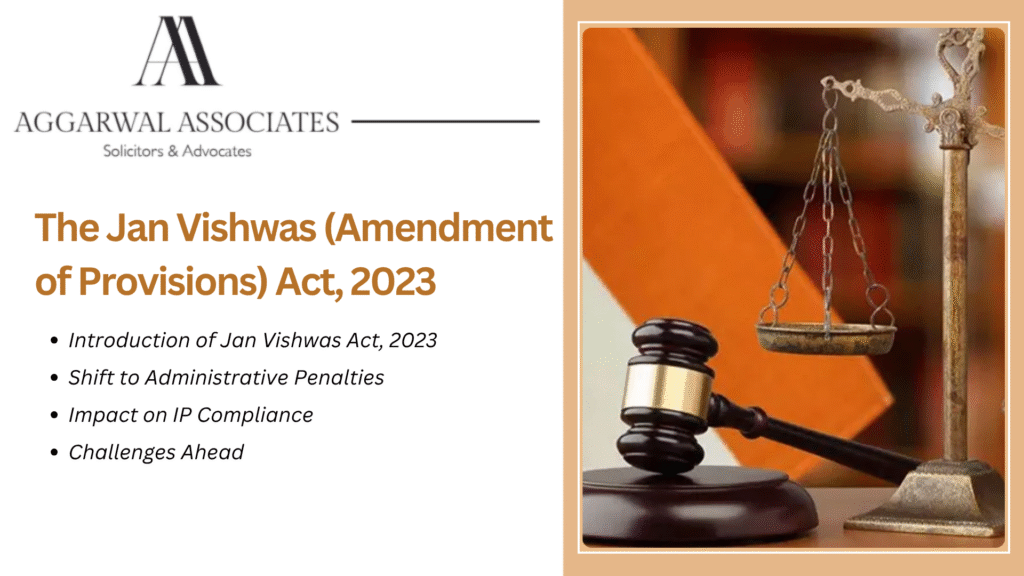Introduction of Jan Vishwas Act, 2023

In August 2023, India enacted the Jan Vishwas (Amendment of Provisions) Act, 2023, a landmark reform aimed at easing business operations by decriminalizing minor offenses across 42 laws, including the Patents Act, 1970.
Effective from August 1, 2024, this legislation shifts the focus from imprisonment to monetary penalties, reflecting a trust-based governance model. For the intellectual property (IP) community, these changes promise a more compliance-friendly patent system—but at what cost? This article delves into the Act’s amendments to patent law and their implications for IP compliance in India.
Main Content
The Jan Vishwas Act, 2023, seeks to simplify regulatory frameworks, reducejudicial backlog, and foster innovation by replacing punitive measures with fines. Its amendments to the Patents Act, 1970, are particularly significant for inventors, businesses, and IP practitioners. Key changes include:
1. Decriminalization of Offenses
- Section 120 (Unauthorized Claim of Patent Rights): Previously punishable with a fine up to ₹1 lakh, this offense now carries a penalty of up to ₹10 lakh, plus ₹1,000 per day for continuing violations. Imprisonment is no longer an option.
- Section 122 (Failure to Supply Information): The maximum fine drops from ₹10 lakh to ₹1 lakh, with an additional ₹1,000 daily penalty, removing the six-month imprisonment clause.
- Section 123 (Practice by Non-Registered Agents): The penalty rises to ₹5 lakh (from ₹1 lakh for first offenses), with a ₹1,000 daily fine, eliminating jail time.
Implication: By removing imprisonment, the Act reduces the fear of criminal liability, encouraging compliance without overburdening businesses with harsh penalties. However, the steep fines signal a zero-tolerance approach to repeat offenders.
2. Shift to Administrative Penalties
The Act introduces Section 124A, empowering the Controller of Patents to impose penalties after an inquiry, with appeals handled under Section 124B. This administrative framework, detailed in the Patents (2nd Amendment) Rules, 2024, aims to resolve disputes outside courts.
Implication: Faster resolution could ease compliance for patent holders, but the Controller’s expanded role requires consistent, transparent adjudication to avoid arbitrariness.
3. Impact on IP Compliance
- Ease of Doing Business: Decriminalization aligns with the government’s goal of reducing legal hurdles, particularly for startups and MSMEs. The focus on fines over jail time lowers the stakes for minor procedural errors.
- Deterrence vs. Innovation: Higher penalties deter misuse, but they may strain smaller entities lacking robust IP management. Conversely, the lighter touch on first-time offenders could encourage patent filings by reducing risk.
- Global Alignment: By emphasizing civil penalties, India mirrors mature IP regimes like the U.S., potentially boosting foreign investor confidence.
Implication: Businesses must now prioritize compliance audits and legal oversight to avoid hefty fines, balancing innovation with regulatory adherence.
4. Challenges Ahead
While the Act streamlines enforcement, its success hinges on implementation. The Controller’s office needs capacity-building to handle inquiries effectively, and clear guidelines are essential to prevent misuse of the complaint mechanism (e.g., vexatious claims by competitors). Additionally, the transition from criminal to civil penalties may require cultural adaptation among stakeholders accustomed to stricter enforcement.
For IP practitioners, the Act shifts the focus from litigation to compliance counseling, urging clients to maintain accurate patent records and avoid misrepresentation. Companies in patent-heavy sectors like pharmaceuticals and technology should update their IP strategies to reflect this new reality.
Conclusion
The Jan Vishwas Act, 2023, redefines patent enforcement in India by decriminalizing offenses and prioritizing monetary penalties. While it promises a more business-friendly IP regime, its effectiveness depends on robust implementation and stakeholder adaptation. As India’s patent landscape evolves, staying compliant is more critical than ever. Contact our IPR firm for expert assistance in aligning your IP strategy with these transformative changes—we’re here to guide you every step of the way.
